
"Yeah, that's my trash on the floor. You got a problem, amigo?"
Now I know that people litter no matter what country or corner of the globe you’re in. It’s a fact of life and one that people who respect the environment cringe at the sight of. In most industrialized nations, the government in conjunction with these deep-rooted environmentalists form some sort of campaign to stop the pollution of our planet. Such a simple thing, they tell the populace, as placing your empty gum wrapper in a bin instead of on the street can make a world of difference. Everyone is always on the lookout for a litterbug and people generally turn up their noses at the sight of one. At the end of the day, those who litter form the minority of an environmentally-conscious whole.
In Spain, however, the opposite seems to be true. Everyone litters. People toss papers, cans, bottles, bags, fruit skins, empty cigarette cartons, sandwich wrappers, warped umbrellas, toilet seats, fruit & vegetable crates, broken light bulbs, diapers and whatever else you can think of onto the street and into the sea. In the cafés, customers ignore ashtrays, tables, and counters and opt for the floor as their trash bin of choice. Stranger yet, the proprietor gladly sweeps up after them every few minutes because he views this kind of behavior as normal. I wouldn’t be surprised if that very café owner tosses his trash on the floor too when he visits other cafés. And on the streets, it’s even worse. Wherever one spots a group of Spaniards, there will always be a few pieces of litter left in their wake – sprinkled by the omnipresent shells of those sunflower seeds they so dearly love to eat.

Where the hell did all those umbrellas come from?
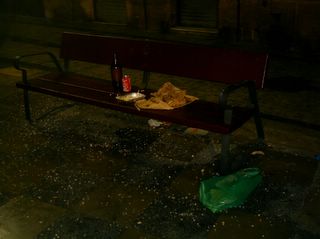
Just a regular park bench after a little snack... sunflower shells included
As far as I can tell, the Spanish must see it as their God-given right to litter. At any time of day, on whichever street corner of Cádiz you find yourself, you’re bound to find at least one piece of litter strewn on the cobblestoned pavement below. Even when you look over the city walls towards the sea – onto the massive boulders that protect the residents from the crashing waves of the mighty Atlantic – one can’t help but notice the piles of trash that haplessly have been tossed aside here. These boulders have now become a feeding ground for stray cats and seagulls as they scavenge the litter and pick at anything that might resemble a morsel of food. This type of behavior is even more difficult to understand when one considers that the sea has been this city’s lifeline since the day it was founded. Recently, in these times of rough unemployment, it has been one of the only reasons why tourists come to visit. A "day at the beach" must contribute hundreds of thousands of euros to the struggling local economy and yet, still, the Gaditanos view the Atlantic as nothing more than their local dump. If they can’t toss litter into the vast ocean, then where should they?

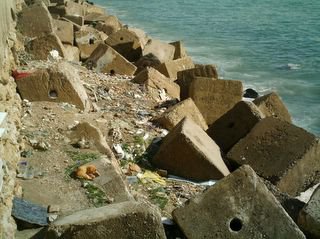
Ahh, Cádiz! Postcard picture perfect - just... ...DON'T LOOK DOWN!
The zenith of all this littering, though, occurs during public festivals or Carnaval, which is fast approaching at only a month away. The pre-Carnaval celebrations that have been going on over the past two weekends have been a sign of things to come – piles of trash scattered throughout the streets. As we were walking around this Sunday (Erizada, or Sea-Urchin Fest, was taking place in our neighborhood) we found it difficult to ignore how much litter had accumulated outside our door. I understand that oftentimes, especially during public celebrations, there may be no trash can or bin of any sort available for public use in the vicinity. But this isn’t the case in Cádiz. Before each Fest, the city sets up extra bins every few steps away for the revelers to use... but they simply ignore them. We saw countless piles of trash strewn on the ground while practically empty bins stood in their midst. I don’t understand. How difficult can it be to lift your arm and throw that bottle or used plastic plate into the empty bin by your side? We even saw a couple of people using the trash bin tops as tables to rest their food and drinks on or, even worse, they would simply pile their trash on top of the bin without bothering to open it– as if a plastic cover can be that heavy!

Spain's only Environmentalist:
"Where's the trash bin? Oh well, I'll just leave my dirty cups and plates on this plastic lid."
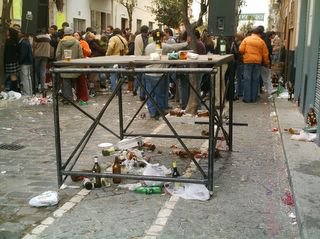
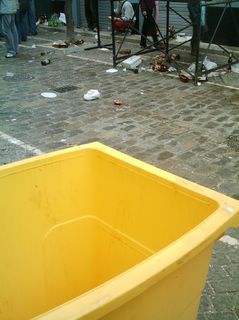
The littered remains of pre-Carnaval fun... ...And the empty trash bin next to it.
One of the most frightening things in all of this littering-mayhem is the attitude of Spaniards – even what must be environmentally-conscious Spaniards if they actually do exist – towards others who pollute. The locals really don’t give a damn at all. In fact, none of it seems strange in the least to them. Why walk to a bin, the local reasoning must go, when you can just as easily toss it on the ground? And this kind of conditioning to a lack of environmental awareness starts young and continues into adulthood. Not once have I seen a child reprimanded for dropping a candy wrapper, or an adult look at one of his fellow countrymen and shake his head in disgust as someone soils his beloved España.
I don’t want to try and rationalize this behavior and, frankly, I’m really not sure why the natives of this lovely land treat their country in such a manner, but I think it might be subconscious. They’ve been programmed to think this way. For example, as far as I know, there is no word in Spanish that litter can be directly translated into. All there is that I could find was basura, or trash, and papeles, which literally means papers. And as for the verb to litter the nearest one can come to translating it is either ensuciar, to get something dirty, or tirar papeles, to throw papers. Even litterbug, or litter lout as the Brits say, can only be rendered into Spanish as persona que tira papeles en la vía pública, or person who throws papers in the public street. No wonder there’s so much litter and no public campaigns to improve the environment here in Spain. The catchy saying we have back home, "Don’t be a litterbug!" doesn’t seem quite as catchy when translated into "Don’t be one of those people who throw papers in the public street!"

"I love litter! Without it, I'd be homeless."
When you take these linguistic shortcomings into mind, it starts to explain some of the Spanish attitude towards litter. But what really completes the picture is how much the government – both local and national – must spend on cleaning up after its citizens. Cádiz, more or less, is quite a clean city especially when you take into account how much people litter. This is due to one thing and one thing alone – the ever-vigilant local garbage-men. Trash is collected every night outside each resident’s door and the streets and trash cans (both public and private ones) are sprayed down clean with a high-powered hose using a disinfectant liquid mixture. Well actually, that’s not completely true. First a group of garbage-men SWEEP the street and then they spray it down... And this happens practically every night and sometimes even during the day too! When I first moved here and would walk home from a bar at two or three in the morning, I was always curious as to why the streets were all wet when it hadn’t even rained a drop. It took me a few months before I figured out those damp cobblestones were all that was left of the Garbage-Man Posse’s evening stroll through the city.
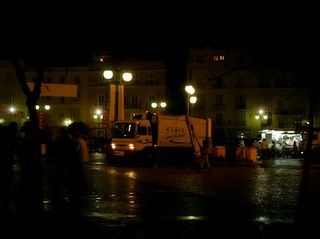

I salute ye, O brave Garbage-Man! Vigilantly cleaning the streets both at night and at day! Litter, beware!

Who can wash the streets down and make the mornings shine?
The Garbage-Man can! The Garbage-Man can!
After a foreigner in Spain considers all of these factors, he can begin to at least try and understand the local attitude to litter. Now I’m not trying to excuse them, but the way the residents of Cádiz see it is "Why clean up when someone else will do it for me?" And even if they don’t know that someone is cleaning up after them, when a Gaditano wakes up the next morning, he inevitably finds his city as clean as a whistle and litter free. Who cares where the trash went as long as it’s gone? The entire situation reminds me of when I cook a little snack or make myself some coffee and pile up the dirty dishes in the sink. The next day they’re all inevitably gone too – cleaned and put away in the cupboard. How they got washed and placed there (although I do suspect my girlfriend may be somehow involved), I’ll never know. But then again, do I really care? As long as the sink is empty and the kitchen is clean, I’m happy. I suppose the Spanish are the same way when it comes to their litter.
